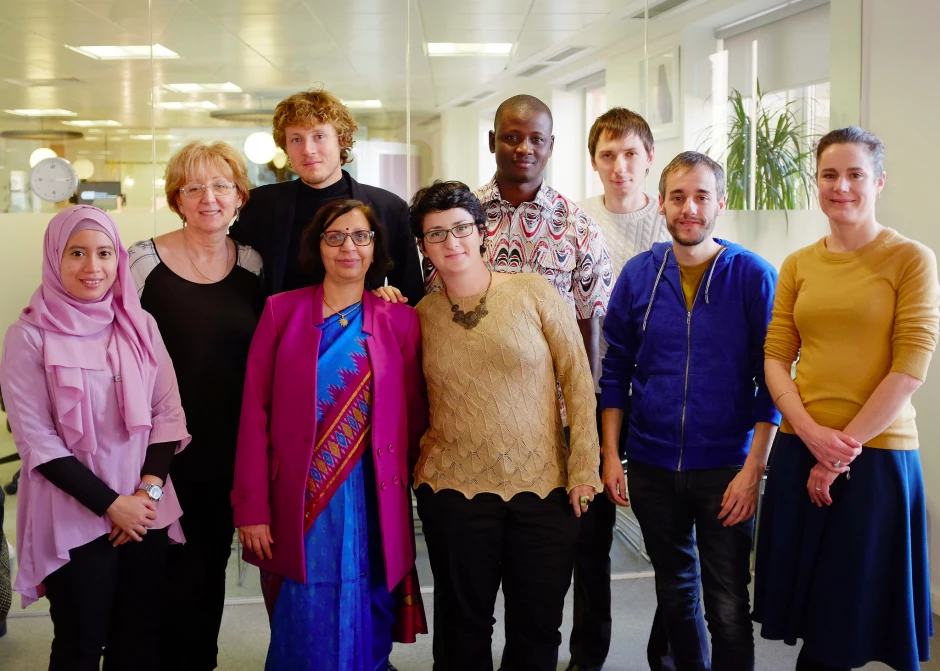When discussing openness and transparency in government, it would be easy to imagine countries like India and Ukraine have more differences than similarities. India is often described as the world’s largest democracy with a federalized government system that gives financial and legislative rights to regions, while Ukraine is a former Soviet Union state with a historically centralized power system.

Pictured L-R: Tezza Nur Rasika - Indonesia, Marija Kujacic - Serbia, Marco Bani - Italy, Alka Mishra - India, Fernando Campagnucci - Brazil, Malick Tapsoba - Burkina Faso, Alexsey Vyskub - Ukraine, Jose Ma Subero - Spain, Pauline Riordan - Ireland
However, when it comes to implementing open data programs to improve civic engagement, the two countries have a surprising amount in common.
During a gathering of the Open Data Institute’s Open Data Leaders Network in March this year, public sector delegates from India and Ukraine joined peers from across the world responsible for publishing data and encouraging businesses, developers and citizens, to use data to innovate. The delegates from India and Ukraine shared a common vision for their governments: to engage better with citizens by using open data – data that any anyone can access, use or share – as a mechanism for transparency and interaction.
India and Ukraine’s open data initiatives
In February 2015, the Ukrainian government launched a public-private partnership called ProZorro to increase transparency by publishing contracting information. It was inspired by the Ukrainian Revolution of the previous year, and initiated by representatives from numerous NGOs, private businesses and governmental institutions, united around the shared principles and aims of ProZorro: promoting maximum participation of all stakeholders; transparency in all decisions; focus on crowdsourcing and crowdfunding; using accessible software code; and standard protocols for data exchange.
The initiative makes any document or information related to public procurement open and available online, including the estimated value of the contract, tender documentation and the decisions of evaluation committees. The slogan for the new Ukrainian procurement system is Everyone Eyes Everything.
There are now well over 100 ProZorro members. Since its launch, more than 52,000 tenders have been openly delivered using the system, and more than 12% cost savings have been achieved. In 2015 the Ministry of Economic Development and Trade of Ukraine released historic state procurement data from 2008 till the present day, previously kept under lock and key. Now a huge army of civic activists regularly investigate it, identifying many instances of high corruption from previous years.
In India, the platform mygov.in was launched in 2014 to drive citizen engagement and encourage greater exchange of ideas between individuals and the government on policy issues. Using the platform, users can join forums and put forward ideas on issues including smart cities, accessibility for the disabled, and reducing pollution to the Ganges.
In the lead up to the launch of India’s 2016 budget, mygov.in received over 70,000 suggestions for how the government can implement for efficient processes and reduce loopholes that can be exploited for corruption. Some of these ideas were reflected in the budget proposals presented by departments. Case in point: the Ministry for Railways added over 15 citizen ideas that originated from mygov.in in the 2016-17 railway budget. These included introducing fully unreserved coaches on long-distance trains travelling busy routes, reducing the weight of engineering tools carried by staff while patrolling, and setting aside funding to provide grants to employees, startups and small businesses to encourage innovation.
The parallels
Both projects were created as part of a conscious effort from governments in India and the Ukraine to bring citizens closer to the decisions and running of government departments. ProZorro was created after a mix of independent studies and civil groups made it very clear that the Ukrainian procurement system was ineffective and inefficient. Meanwhile during the official launch of mygov.in, Prime Minister Modi spoke of the need to “bridge the gulf between people and government”, emphasizing that democracy is not just limited to voting in elections, but an ongoing relationship between the state and citizen.
ProZorro and Mygov.in took mixed methods approaches to reaching citizens, both directly and through influencers. To create maximum impact, both projects combined senior government advocacy, in the form of Prime Minister Modi in India and the Ministry of Economic Development and Trade in Ukraine. Both teams also had a small staff and limited resources, so relied on partnerships with NGOs, community organizations and the media to explain the rationale behind the projects, promote their benefits and obtain maximum reach and engagement.
What open data leaders have learned from each other
Uniting these open data leaders gave them the space to collectively work through challenges such as sustaining momentum for their programs and getting more government departments to release data. It also gave them the opportunity to connect other ideas and evidence from the open data community, as well as create a platform to amplify and raise awareness of their successes.
Mygov.in and ProZorro were implemented from within the public sector and have begun to impact how citizens engage with government, building trust through transparency. Hearing from the leaders has reinforced a clear message: open data, transparency, and innovation initiatives within government help shed light on the problems they want to solve, increase flexibility, and initiate thoughtful, successful partnerships.


Join the Conversation